24 Sickened in Salmonella Outbreak Linked to Laboratories in 16 States
CNN/Stylemagazine.com Newswire | 7/20/2017, 1:37 p.m.
By Victoria Knight
CNN
(CNN) -- Twenty-four people in 16 states were infected with a strain of salmonella from March through June in an outbreak linked to microbiology laboratories, the US Centers for Disease Control and Prevention reported Wednesday. Six people were hospitalized, but no deaths have been reported.
The CDC released an investigation notice about the outbreak of the Salmonella typhimurium strain, which was also linked to infections in microbiology labs in 2011 and 2014.
The infections occurred in clinical, commercial, college and university microbiology laboratories in California, Colorado, Florida, Georgia, Iowa, Maine, Michigan, Missouri, North Carolina, New Hampshire, New Jersey, New Mexico, New York, Oklahoma, Texas and Washington. Those affected ranged in age from less than a year to 57 years old.
Salmonella bacteria can cause diarrhea, fever and abdominal cramps. Though most people recover without treatment, severe cases can require antibiotics or hospitalization. Those with impaired immune systems, as well as the elderly and infants, are at greater risk of severe illness from a salmonella infection. The CDC estimates that 380 people die and a million become ill from salmonella each year.
In response to previous lab-related outbreaks, the CDC released a set of guidelines for students, employees and faculty members to use when working in microbiology laboratories. It includes not bringing home items used in the lab; following proper biosafety training; wearing gloves, a lab coat or other protective garments; actively washing hands; and avoiding touching your face or body while in the lab.
Several people infected in the latest outbreak reported risky behaviors, such as not wearing gloves, not washing hands and using writing utensils or notebooks outside the laboratory.
Those working in laboratories should also be aware of the signs and symptoms of salmonella infection and see a health care provider if they believe they may be infected, the CDC says. It is also important to note that not only laboratory workers can get sick; people who live with them are also vulnerable.




